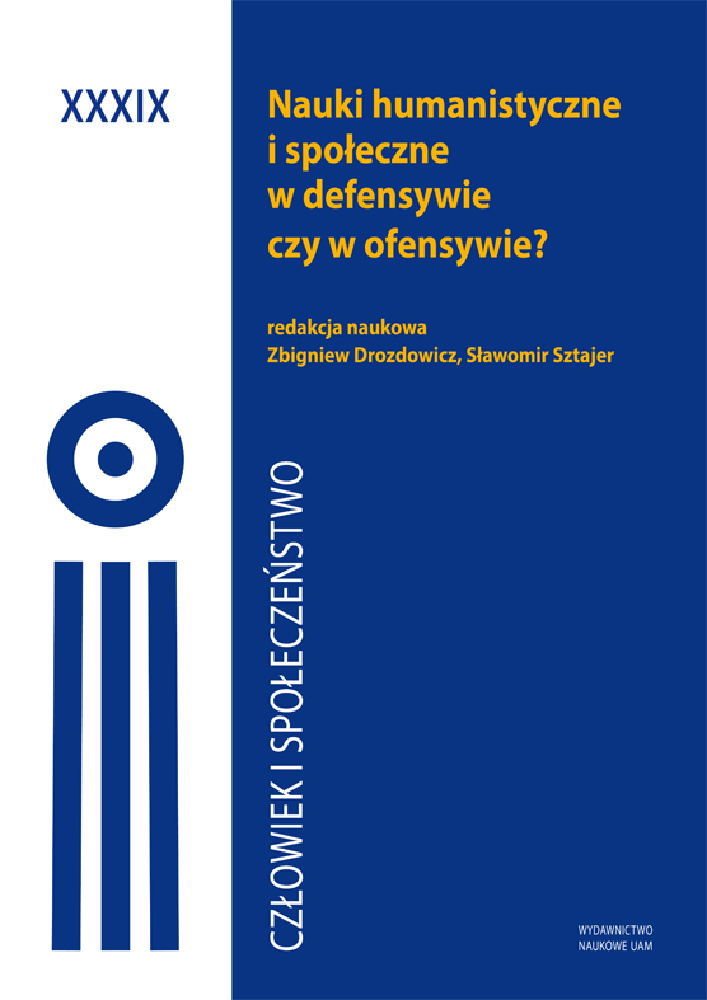Abstrakt
The paper aims at justifying a call to go on the offensive in order to assure for philosophy, the humanities and social sciences a proper place in science as a whole. Against the background of the contemporary social context (transdisciplinary research, seeing science as a source of risks, rejection of a liner model of getting social benefits from basic sciences, recognizing stakeholders’ participation in research) the Author shows that any research project on life problems cannot be executed by natural or technical sciences alone, but it must engage philosophy, the humanities and social sciences. The same is true of applications of accepted solutions. The conclusion is that cooperation between natural, technical and social sciences, philosophy and the humanities is necessary in doing
research and using its achievements. It is also required in education, if scientists and citizens are to act as stakeholders in democratic processes of shaping techno-scientific progress.
Bibliografia
Beck U., Społeczeństwo ryzyka. W drodze do innej nowoczesności, Scholar, Warszawa 2002.
Cartwright N., Well-ordered science: Evidence for use, „Philosophy of Science” 73/2006.
Fehr C., Plaisance K.S., Socially relevant philosophy of science: An introduction, „Synthese” 177/2010.
Frodeman R., Mitcham C., Beyond the Social Contract Myth: Integrating Science and the Common Good, „Issues in Science and Technology” 16(4)/2000.
Gould S.J., Skały wieków. Nauka i religia w pełni życia, Zysk i S-ka, Poznań 2002.
Grabski M.W., Między rządem i nauką – źródła konfliktów, „Nauka” 4/2004.
Hadorn H. i in. (red.), Handbook of Transdisciplinary Research, Springer, Heidelberg 2008.
Hoyningena-Huene P., Weber M., Oberheim E., Towards a new social contract for science, „Nature and Resources” 34(4)/1998.
Lacey H., Is science value free? Values and scientific understanding, Routledge, London – New York 1999.
Lekka-Kowalik A., Uniwersytet jako firma usługowa. Szansa czy klęska?, „Ethos” 85-86/2009.
MacIntyre A., Bóg, filozofia, uniwersytety. Wybrane zagadnienia z historii katolickiej tradycji filozoficznej, tłum. A. Łagodzka, Instytut Wydawniczy „Pax”, Warszawa 2013.
Maxwell N., From Knowledge to Wisdom: A Revolution in the Aims and Methods of Science, Blackwell, Oxford 1984.
Maxwell N., How universities can help to create a wiser world. The urgent need for an academic revolution, Imprint Academic, Exeter 2014.
Novotny H., Limoges C., Scott P., Gibbons M., The New Production of Knowledge: The Dynamics of Science and Resarch in Contemporary Societies, Sage, London 1994.
Novotny H., Scott P., Gibbons M., „Mode 2” revisited: The New Production of Knowledge, „Minerva” 41/2003.
Nussbaum M.C., Not For Profit: Why Democracy Needs the Humanities, Princeton University Press, Princeton 2010.
OECD, Governance of Public Research: Toward Better Practices, Paris 2003.
OECD, Science and Innovation Policy. Key Challenges and Opportunities, Paris 2014, http://www.oecd.org/science/inno/23706075.pdf [29.12.2014].
Słownik języka polskiego PWN, http://sjp.pwn.pl/sjp/ofensywa;2494184.html [31.12.2014].
http://isip.sejm.gov.pl/DetailsServlet?id=WDU20111791065 [2.01.2015].
http://prawo.ws/o_szkolnictwie_wyzszym/art3.htm [2.01.2015].
http://www.dn.uj.edu.pl/documents/1333504/3092436/2003_tekst_jednolity_ustawa_%20o_stopniach_nauk.pdf [31.12.2014].
http://www.humanitiescommission.org/_pdf/hss_report.pdf [2.01.2015].
http://www.praktykateoretyczna.pl/postulaty-programowe-komitetu-kryzysowego-humanistyki-polskiej/ [1.01.2015].
https://www.nsf.gov/od/lpa/nsf50/vbush1945.htm [17.12.2014].
Licencja
1. W momencie złożenia pracy celem rozpoczęcia postępowania w sprawie publikacji, Licencjodawca, zwany dalej Autorem, akceptuje wszystkie zasady umieszczone na stronie internetowej czasopisma “Człowiek i Społeczeństwo”, udzielając Licencjobiorcy, zwanego dalej Wydawcą, niewyłącznej i nieodpłatnej licencji na korzystanie z Utworu. Licencja zakłada tym samym brak ograniczeń terytorialnych, czasowych oraz ilościowych na następujących polach eksploatacji (art. 50 ustawy z dnia 4 lutego 1994 r. o prawie autorskim i prawach pokrewnych):
a. utrwalanie Utworu;
b. zwielokrotnienie Utworu drukiem i w wersji cyfrowej;
c. wprowadzenie do obrotu, użyczenie lub najem oryginału/zwielokrotnionych egzemplarzy Utworu;
d. publiczne wykonanie, wystawienie, wyświetlenie, odtworzenie oraz nadawanie i reemitowanie, a także publiczne udostępnianie Utworu w taki sposób, aby każdy mógł mieć do niego dostęp w miejscu i w czasie przez siebie wybranym;
e. włączenie Utworu w skład utworu zbiorowego;
f. wprowadzenie Utworu w postaci elektronicznej na platformy elektroniczne lub inne wprowadzenie Utworu w postaci elektronicznej do Internetu, Intranetu, Extranetu lub innej sieci;
g. rozpowszechnianie Utworu w wersji elektronicznej w Internecie, Intranecie, Extranecie lub innej sieci, w pracy zbiorowej, a także samodzielnie w formule Open Access w oparciu o licencję Creative Commons Uznanie autorstwa 4.0 Międzynarodowa Licencja Publiczna (CC BY 4.0), a także inną wersję językową tej licencji, lub którąkolwiek późniejszą wersję tej licencji.
2. Założenia licencji Creative Commons Uznanie autorstwa 4.0 Międzynarodowa Licencja Publiczna (CC BY 4.0), udzielają Wydawcy upoważnienia do kopiowania, zmieniania, rozprowadzania, przedstawiania i wykonywania Utworu jedynie pod warunkiem uznania autorstwa.
3. Wraz z dostarczeniem Utworu, Autor zobowiązuje się do wypełnienia, podpisania oraz odesłania skanu umowy
